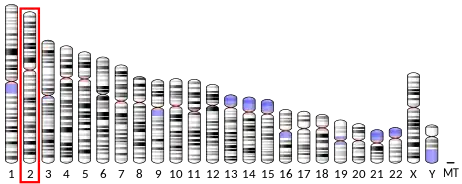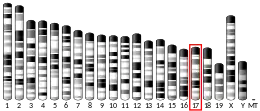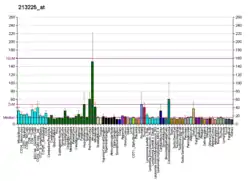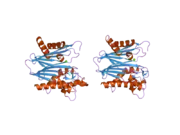PPM1B
Protein phosphatase 1B is an enzyme that in humans is encoded by the PPM1B gene.[5][6]
| PPM1B | |||||||||||||||||||||||||||||||||||||||||||||||||||
|---|---|---|---|---|---|---|---|---|---|---|---|---|---|---|---|---|---|---|---|---|---|---|---|---|---|---|---|---|---|---|---|---|---|---|---|---|---|---|---|---|---|---|---|---|---|---|---|---|---|---|---|
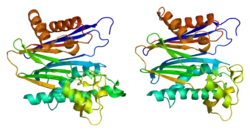 | |||||||||||||||||||||||||||||||||||||||||||||||||||
| |||||||||||||||||||||||||||||||||||||||||||||||||||
| Identifiers | |||||||||||||||||||||||||||||||||||||||||||||||||||
| Aliases | PPM1B, PP2C-beta, PP2C-beta-X, PP2CB, PP2CBETA, PPC2BETAX, protein phosphatase, Mg2+/Mn2+ dependent 1B | ||||||||||||||||||||||||||||||||||||||||||||||||||
| External IDs | OMIM: 603770 MGI: 101841 HomoloGene: 2027 GeneCards: PPM1B | ||||||||||||||||||||||||||||||||||||||||||||||||||
| |||||||||||||||||||||||||||||||||||||||||||||||||||
| |||||||||||||||||||||||||||||||||||||||||||||||||||
| |||||||||||||||||||||||||||||||||||||||||||||||||||
| |||||||||||||||||||||||||||||||||||||||||||||||||||
| Wikidata | |||||||||||||||||||||||||||||||||||||||||||||||||||
| |||||||||||||||||||||||||||||||||||||||||||||||||||
Function
The protein encoded by this gene is a member of the PP2C family of Ser/Thr protein phosphatases. PP2C family members are known to be negative regulators of cell stress response pathways. This phosphatase has been shown to dephosphorylate cyclin-dependent kinases (CDKs), and thus may be involved in cell cycle control. Overexpression of this phosphatase is reported to cause cell-growth arrest or cell death. Alternative splicing results in multiple transcript variants encoding different isoforms. Additional transcript variants have been described, but currently do not represent full-length sequences.[6]
Interactions
PPM1B has been shown to interact with:
References
- GRCh38: Ensembl release 89: ENSG00000138032 - Ensembl, May 2017
- GRCm38: Ensembl release 89: ENSMUSG00000061130 - Ensembl, May 2017
- "Human PubMed Reference:". National Center for Biotechnology Information, U.S. National Library of Medicine.
- "Mouse PubMed Reference:". National Center for Biotechnology Information, U.S. National Library of Medicine.
- Marley AE, Kline A, Crabtree G, Sullivan JE, Beri RK (August 1998). "The cloning expression and tissue distribution of human PP2Cbeta". FEBS Lett. 431 (1): 121–4. doi:10.1016/S0014-5793(98)00708-X. PMID 9684878. S2CID 84075989.
- "Entrez Gene: PPM1B protein phosphatase 1B (formerly 2C), magnesium-dependent, beta isoform".
- Cheng A, Kaldis P, Solomon MJ (November 2000). "Dephosphorylation of human cyclin-dependent kinases by protein phosphatase type 2C alpha and beta 2 isoforms". J. Biol. Chem. 275 (44): 34744–9. doi:10.1074/jbc.M006210200. PMID 10934208.
- Prajapati S, Verma U, Yamamoto Y, Kwak YT, Gaynor RB (January 2004). "Protein phosphatase 2Cbeta association with the IkappaB kinase complex is involved in regulating NF-kappaB activity". J. Biol. Chem. 279 (3): 1739–46. doi:10.1074/jbc.M306273200. PMID 14585847.
- Hanada M, Ninomiya-Tsuji J, Komaki K, Ohnishi M, Katsura K, Kanamaru R, Matsumoto K, Tamura S (February 2001). "Regulation of the TAK1 signaling pathway by protein phosphatase 2C". J. Biol. Chem. 276 (8): 5753–9. doi:10.1074/jbc.M007773200. PMID 11104763.
- Tasdelen I, van Beekum O, Gorbenko O, Fleskens V, van den Broek NJ, Koppen A, Hamers N, Berger R, Coffer PJ, Brenkman AB, Kalkhoven E (2013). "The serine/threonine phosphatase PPM1B (PP2Cβ) selectively modulates PPARγ activity". Biochem. J. 451 (1): 45–53. doi:10.1042/BJ20121113. PMID 23320500.
Further reading
- Hishiya A, Ohnishi M, Tamura S, Nakamura F (1999). "Protein phosphatase 2C inactivates F-actin binding of human platelet moesin". J. Biol. Chem. 274 (38): 26705–12. doi:10.1074/jbc.274.38.26705. PMID 10480873.
- Cheng A, Ross KE, Kaldis P, Solomon MJ (2000). "Dephosphorylation of cyclin-dependent kinases by type 2C protein phosphatases". Genes Dev. 13 (22): 2946–57. doi:10.1101/gad.13.22.2946. PMC 317162. PMID 10580002.
- Cheng A, Kaldis P, Solomon MJ (2000). "Dephosphorylation of human cyclin-dependent kinases by protein phosphatase type 2C alpha and beta 2 isoforms". J. Biol. Chem. 275 (44): 34744–9. doi:10.1074/jbc.M006210200. PMID 10934208.
- Hanada M, Ninomiya-Tsuji J, Komaki K, Ohnishi M, Katsura K, Kanamaru R, Matsumoto K, Tamura S (2001). "Regulation of the TAK1 signaling pathway by protein phosphatase 2C". J. Biol. Chem. 276 (8): 5753–9. doi:10.1074/jbc.M007773200. PMID 11104763.
- Parvari R, Brodyansky I, Elpeleg O, Moses S, Landau D, Hershkovitz E (2001). "A recessive contiguous gene deletion of chromosome 2p16 associated with cystinuria and a mitochondrial disease". Am. J. Hum. Genet. 69 (4): 869–75. doi:10.1086/323624. PMC 1226072. PMID 11524703.
- Seroussi E, Shani N, Ben-Meir D, Chajut A, Divinski I, Faier S, Gery S, Karby S, Kariv-Inbal Z, Sella O, Smorodinsky NI, Lavi S (2001). "Uniquely conserved non-translated regions are involved in generation of the two major transcripts of protein phosphatase 2Cbeta". J. Mol. Biol. 312 (3): 439–51. doi:10.1006/jmbi.2001.4967. PMID 11563908.
- Prajapati S, Verma U, Yamamoto Y, Kwak YT, Gaynor RB (2004). "Protein phosphatase 2Cbeta association with the IkappaB kinase complex is involved in regulating NF-kappaB activity". J. Biol. Chem. 279 (3): 1739–46. doi:10.1074/jbc.M306273200. PMID 14585847.
- Parvari R, Gonen Y, Alshafee I, Buriakovsky S, Regev K, Hershkovitz E (2005). "The 2p21 deletion syndrome: characterization of the transcription content". Genomics. 86 (2): 195–211. doi:10.1016/j.ygeno.2005.04.001. PMID 15913950.
- Rual JF, Venkatesan K, Hao T, Hirozane-Kishikawa T, Dricot A, Li N, Berriz GF, Gibbons FD, Dreze M, Ayivi-Guedehoussou N, Klitgord N, Simon C, Boxem M, Milstein S, Rosenberg J, Goldberg DS, Zhang LV, Wong SL, Franklin G, Li S, Albala JS, Lim J, Fraughton C, Llamosas E, Cevik S, Bex C, Lamesch P, Sikorski RS, Vandenhaute J, Zoghbi HY, Smolyar A, Bosak S, Sequerra R, Doucette-Stamm L, Cusick ME, Hill DE, Roth FP, Vidal M (2005). "Towards a proteome-scale map of the human protein-protein interaction network". Nature. 437 (7062): 1173–8. Bibcode:2005Natur.437.1173R. doi:10.1038/nature04209. PMID 16189514. S2CID 4427026.
This article is issued from Wikipedia. The text is licensed under Creative Commons - Attribution - Sharealike. Additional terms may apply for the media files.
